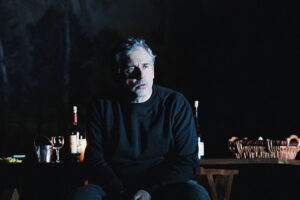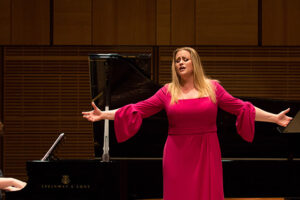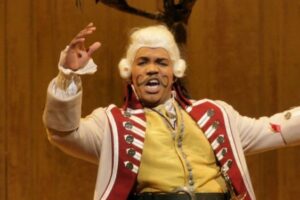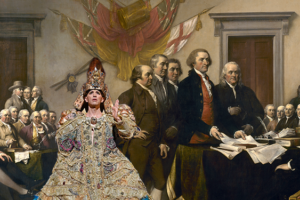
For all his historical importance Christoph Willibald Gluck remains one of the least known and performed of the great opera composers. Although he wrote nearly 50 operas, he’s primarily remembered for just one—his ground-breaking Orfeo ed Euridice, the first so-called “reform” opera—one often performed and recorded in adaptations the composer would scarcely recognize.
However, opera houses and recording companies are more regularly exploring the Gluck beyond Orfeo, including numerous productions of his late French masterpiece Iphigénie en Tauride, this year’s Met/Juilliard Armide, and Alceste at the Vienna Staatsoper next season. Recently recordings of the much rarer Ezio and Il Trionfo di Clelia have been released providing fascinating insights into the “unknown” Gluck.
Like many itinerant composers of the time who traveled from city to city for commissions or church or court jobs, the protean German-born Gluck moved as a youngster to Bohemia and studied in both Prague and Italy, where he wrote his first opera for Milan in 1741 at the age of twenty-seven and later dominated the opera scene in Vienna, then Paris.
Of his first ten operas six were composed to texts by the ubiquitous Pietro Metastasio, the most popular librettist of the day, but only one of the ten—Ipermestra (Venice 1744)—has survived complete. Ezio, composed in 1750 for the Kotzentheater in Prague and Il Trionfo di Clelia commissioned for the opening of Bologna’s Teatro Communale in 1763 both feature Metastasian texts too. The irony, of course, is that it is precisely Metastasian opera that Gluck (and his librettist Ranieri de’Calzabigi) rebelled against with Orfeo and Alceste in the 1760s, forever changing the operatic world.
Those familiar with Gluck only from the later operas may be surprised at these earlier works which straddle the baroque and classical periods yet seem not to fully belong to either. The fame of the “reform” operas has overshadowed Gluck’s long and successful career composing opera seria—and he also wrote French opera-comiques for Vienna in the 1750s. His opera seria (like Ezio and Trionfo) continue to be dominated by arias (usually in variations of the da capo form) which tend to be longer and more elaborate than those of earlier baroque composers with often richer, more varied instrumentation.
Comparable examples of these later opera seria (both excellent) include Christophe Rousset’s Jommelli Armida abbandonata and Andrea Marcon’s Galuppi L’Olimpiade
If one has heard or seen Mozart’s earliest operas like Mitridate, re di Ponto or Lucio Silla, one will have a sense of what Gluck’s opera seria are like.
Astonishingly, the new Ezio conducted by Alan Curtis for Virgin Classics is that work’s third recording
in the past few years although the Oehms features a revised score
done for Vienna in 1763.
A complex drama focused on a fraught love triangle being manipulated from behind the scenes by the heroine’s father, Ezio was one of Metastasio’s most popular libretti, first set by Porpora, then Auletta in 1728, and later by others like Traetta and Myslivecek. Clearly Alan Curtis has a special interest in Ezio having performed (and, according to rumor, also recorded) one of Jommelli’s three versions as well as recorded Handel’s 1732 opera for Archiv several years ago, a CD which shares several cast members with his Gluck version: Ann Hallenberg, who sings the Handel hero, swaps sexes to Fulvia, Gluck’s heroine, whereas Sonia Prina, Ezio in the Gluck, reigns as Handel’s Emperor Valentiniano.
Metastasio didn’t appear to interest Handel much, and his Ezio is not generally considered one of his better operas. Curtis’s pleasant Archiv rendition won’t change many minds about that score. On the other hand, Poro, (also a Handel-Metastasio collaboration) proves to be one of Handel’s most unjustly neglected works.
Unfortunately, as is so often the case with Curtis, he fails to make a very compelling case for Gluck’s version either. In my experience live performances by Curtis tend to be more interesting than recordings; however Ezio, an amalgam of a concert (with a different tenor) from Poissy in 2008 and some extra sessions, is often disappointingly bland, although Gluck isn’t at his most inspired here either. Despite the highly dramatic situations, the string of arias remains stubbornly sedate when one yearns instead for passion and fire; only the heroine Fulvia seems to have really moved the composer. Gluck does, however, add an explosive trio that doesn’t exist in Metastasio’s original text to end act II.
Sadly, mezzo Sonia Prina has been sounding pretty threadbare recently, and as Ezio her often harsh voice displays little beauty. Despite her idiomatic handling of the text, her effortful singing is particularly distressing at anything above mezzo forte. The Emperor’s sister unhappily in love with Ezio, Mayuko Karasawa’s wiry and wan Onoria is a bit of a trial too.
The scheming Massimo, Fulvia’s father, ironically gets some of the gentlest, loveliest music, particularly his long first act aria which was later reworked as Orfeo’s rapturous greeting to Elysium “Che puro ciel.” (Gluck was a champion self-borrower.) By casting sweet-voiced Topi Lehtipuu, Curtis errs on the side of the music rather than the drama as the tenor sounds entirely too nice. Max Emanuel Cencic’s Valentiniano isn’t as characterful as some of his more recent portrayals but there’s always a vibrant connection to the Emperor’s oddly mild music.
One of today’s best singers, Ann Hallenberg as Fulvia easily dominates the performance, her opulent high smoky mezzo at its peak. Passionately embodying Fulvia’s struggle between conflicting allegiances to father, lover and emperor, Hallenberg makes her act III scena “Misera dove son!” the enthralling climax to the opera (see below), while also inspiring Cencic and Lehtipuu to surpass themselves in that forceful trio.
However, as a follow-up to its very fine series of Handel operas conducted by George Petrou, MDG trumps Virgin in nearly every way with a smashing world premiere recording
of Il Trionfo di Clelia, sure to be remembered as one of the best of 2012.
Conducting Armonia Atenea in an edition he recently unearthed, Giuseppe Sigismondi de Risio inspires his relatively unknown, at times uneven cast to make the best possible case for this heretofore obscure Gluck gem. Although written directly after Orfeo, Trionfo avoids the seismic advances of its predecessor returning to the safe haven of Metastasian opera seria, yet it’s clearly a work that fired Gluck to compose music more consistently exciting and involving than almost anything in Ezio. Perhaps being commissioned to write for the opening of the current Bologna opera house spurred him to surpass himself, while at the same time Gluck played it safe giving the Italian public the kind of work it would be expecting rather than challenging it in the way he had just done in Vienna with Orfeo.
Like Ezio, Trionfo features a noble Roman heroine struggling to fend off the advances of an unwanted suitor while remaining true to her lover amid threatening political upheaval. Although there are still numerous flashy arias, there are also some subtle formal innovations. Act II contains a long sequence with no arias at all; instead several accompanied recitatives alternate with orchestral marches and sinfonias. After her two major arias in Act I, the heroine Clelia surprisingly gets only two very short arias for the remainder of the opera.
It has been said that the orchestral writing for Trionfo was so challenging that the Bologna orchestra (not nearly the equal of the group Gluck used in Vienna) came to grief in trying to play it. De Riso’s excellent Greek original-instrument orchestra shines throughout doing fully justice to the richly varied accompaniments featuring extensive use of trumpets, horns and drums. Despite being recorded in the studio, the secco recitatives, here accompanied by George Petrou on the fortepiano, are much more vividly performed than on the (partially) live Ezio.
(only six of the seven recording session videos seem to have been uploaded)
Featured in the Petrou-Handel series as well as several Alan Curtis recordings, Mary-Ellen Nesi has quietly been developing into one of today’s best singers in this music. As the hero Orazio, she has the lion’s share of Trionfo’s most difficult music which her lean russet mezzo sails through with éclat. As accomplished as her singing of Orazia’s more ornate arias is, her rapt spinning out the lines of the very long “Saper ti basti, o cara” (one of those magical slow arias that makes time stand still that Gluck did so very well) makes it one of the opera’s high points.
She is beautifully partnered by Hélène Le Corre as the beleaguered Clelia in the work’s single duet “Si, ti fido al tuo gran core.” On her own, Le Corre makes a moving heroine and despite a somewhat tight upper register brings a formidable coloratura technique to a dazzling performance of the fiendishly florid “Mille dubbi mi destano in petto” which brings act I to a spectacular close.
Turkish soprano Burçu Uyar charms as Larissa, however wildly erratic high notes (particularly in some ill-conceived repeat ornaments) unfortunately mars an otherwise effective portrayal. As bad guy Tarquinio, mezzo Irini Karaianni, also featured in the MDG Handel series, again, despite a rather ordinary timbre, proves tremendously appealing in her character’s superb music, particularly the showy “Non speri onusto il pino” which ends act II. The young Romanian countertenor Florin Cezar Ouatu, so fine in a recent recording of Vivaldi’s Ottone in Villa, unfortunately has little to do as Mannio.
The exciting discovery here is the impressive young tenor Vassilis Kavayas as Porsenna, the king who holds Clelia prisoner. Only in his mid-20s, Kavayas still has a few rough edges but otherwise impressively tosses off Porsenna’s three demanding arias, particularly his bewitching first act showpiece appropriately accompanied by a vigorously churning orchestra and set to one of Metastasio’s most famous texts:
Sai, che piegar si vede
Il docile arboscello,
Che vince allor che cede
Dei turbini al furor.
Know that the slender shrub
which is seen to bend,
conquers when it yields
to the storm.
His strikingly vivid portrayal shows up the more experienced but too phlegmatic Lehtipuu in a similar role in Ezio.
One hopes that interest in Gluck’s lesser known works continues particularly as the 2014 tricentenary of his birth approaches. Based on an interesting but uneven French broadcast from the 90s, a work worthy of consideration is La Clemenza di Tito, long inevitably overshadowed by Mozart’s. Also it would be fascinating to hear Cythère assiégée in the revision of the 1759 Viennese opera-comique he composed for Versailles in 1775. In the meantime, however, curious listeners will be amply rewarded by MDG’s triumphant Il Trionfo di Clelia, as well as Virgin’s Ezio.
Since the Metastasio phenomenon is unprecedented in opera history—“L’Olimpiade” alone was set more than 60 times—I’ve included this addendum featuring five different takes on the same text, one of Metastatasio’s most famous scenes, Fulvia’s recitative and aria “Misera dove son!” from act III of “Ezio.”
Misera dove son! L’aure del Tebro
Son queste ch’io respiro?
Per le strade m’aggiro
Di Tebe e d’Argo? O dalle greche sponde
Di tragedie feconde
Le domestiche furie
Vennero a questi lidi
Della prole di Cadmo e degli’Atridi?
Là d’un monarco inguisto
L’ingrata crudeltà m’empie d’orrore;
D’un padre traditore
Qua la colpa m’agghiaccia;
E lo sposo innocente ho sempre in faccia.
Oh immagini funeste!
Oh memorie! Oh martiro!
Ed io parlo infelice, ed io respiro?
Ah, non son io che parlo,
E il barbaro dolore,
Ch me divide il core,
Che delirar mi fa.
Non cura il ciel tiranno
L’affanno in cui mi vedo:
Un fulmine gli chiedo,
E un fulmine non ha.
Karina Gauvin sings Porpora’s 1728 version
Netta Or sings Handel’s 1732 version
Ruth Rosique sings Conforto’s concert version (date unknown)
Ann Hallenberg sings Gluck’s 1750 version (unfortunately the aria only)
Gundula Janowitz sings Mozart’s concert aria K.369 (1781)

























Comments